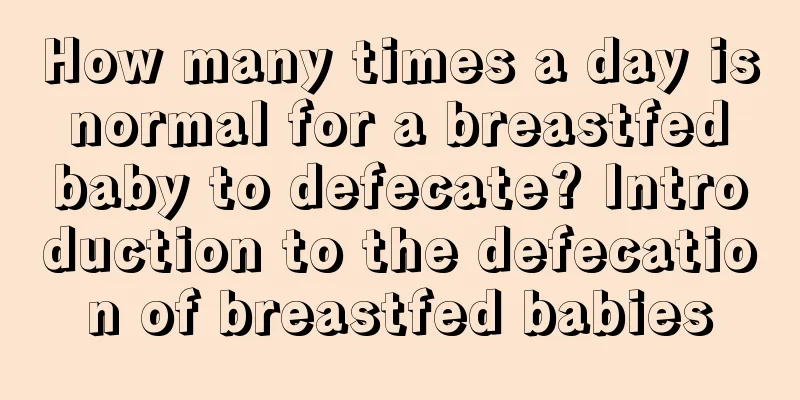What should I do if my baby snores and drools while sleeping?

|
Babies snoring and drooling while sleeping are a headache for many parents. It is recommended that parents take their children to the hospital for examination if their babies snore and drool while sleeping, which will make it easier to alleviate this phenomenon. What to do if your baby snores and drools while sleepingIf a child snores during sleep, you should pay attention to the possibility of nasal secretions or hypertrophy of the nasal glands. The child's nasal passage is relatively narrow, so it is easy to get blocked, which will cause snoring. Most of the time, no treatment is required, but if it is very obvious or causes symptoms such as apnea in the child, you need to see a doctor for confirmation. At present, you can temporarily adjust the body position to see if it can provide relief. Baby drools and snores while sleepingWhen babies sleep at night, their oral mucosa relaxes and their airways become narrower, so snoring is more serious, because we all know that snoring is caused by narrow airways. Especially in early childhood, because babies have narrow nasal cavities, they are more likely to be blocked when they catch a cold. At this time, babies have to breathe through their mouths, which will cause drooling and snoring. Tip: Mothers should also pay attention to whether the baby has a cold or otitis media to prevent the baby from drooling and snoring. If you encounter this kind of situation, you can do the following: 1. Drop two drops of saline solution into the baby's nasal cavity to soften the mucus and make it easier to flow out. 2. Use a humidifier to keep the baby's nasal cavity moist, making it easier to breathe and reducing drooling and snoring. If your baby snores, change his position to widen his airway, or let his neck tilt back slightly, and the snoring will disappear. How to prevent drooling while sleeping1. Make sure your baby sleeps in the correct position If a baby drools while sleeping, it may be caused by the baby's incorrect sleeping posture. For example, sleeping on his stomach or on his side may cause the baby to drool while sleeping, so mothers should adjust the baby's sleeping posture to prevent the baby from drooling. 2. Pay attention to your baby’s oral inflammation The baby drools when sleeping may also be due to pathological reasons, such as the baby's oral infection, which leads to bacterial growth and inflammation, causing oral pain and drooling. At this time, the mother can give the baby some anti-inflammatory drugs to slowly heal the oral ulcers, and the phenomenon of drooling while sleeping will gradually disappear. 3. Prevent baby’s teeth from deforming If the baby's teeth are deformed, especially if the front and back teeth are very concave and convex, then the baby's teeth will be exposed when opening his mouth, and he will not be able to close his mouth when sleeping, which will make the baby drool more easily. In this case, the mother should take the baby to get orthodontic surgery as soon as possible. 4. Prevent neurological diseases If the baby suffers from systemic neurological diseases, such as autonomic nervous system disorders and neurosis, the baby may drool while sleeping, because such diseases can cause abnormal excitement of the baby's nerves, causing errors in brain instructions and increasing saliva secretion. 5. Do not take anti-epileptic drugs Mothers should know that drooling may be a side effect of certain anti-epileptic drugs. Therefore, mothers should be cautious when using medication when their babies are sick to prevent side effects. Identifying medical causes of droolingSometimes babies drool due to normal growth and development, while sometimes it is an abnormal reaction caused by disease. At this time, mothers must pay attention to the baby's physical condition and provide timely treatment. 1. Oral ulcers When oral ulcers occur, small blisters will appear near the mouth and inside the mouth, and the mucous membrane will increase, and the tongue will also ulcerate. At this time, the baby's mouth will be painful, making it difficult for the baby to swallow, and saliva will flow out. 2. Throat inflammation If the baby is drooling and also has runny nose, high fever and other symptoms, then the baby may have a cold, which may cause throat inflammation, tonsillitis and other related diseases that cause swallowing discomfort. At this time, the baby will also drool. 3. Viral infection If a baby is infected with a virus and suffers from diseases such as chickenpox, hand, foot and mouth disease, it can also cause ulcers in the baby's mouth and tongue, causing pain in the baby's mouth, difficulty swallowing, and drooling. 4. Neurological disorders If the baby has neurological problems, it may cause coma, meningitis, mental retardation and other neurological diseases. These will cause facial paralysis, improper use of the mouth and tongue, impaired swallowing function, and drooling. 5. Bites If the baby accidentally bites his tongue, it will affect the peristalsis of the mouth. In the case of oral pain, using the tongue will cause the baby to drool. |
<<: How to effectively limit children's frequent use of the Internet
Recommend
What should I do if my baby has a nosebleed in summer? Is the baby's nosebleed in summer due to getting angry?
Is the baby's nose bleeding in summer due to ...
Can I wear Haichang contact lenses while taking a nap? Can I wear Haichang contact lenses for 12 hours?
Generally speaking, naps are not very long, only ...
Which country's brand does Pampers diapers come from? How long is the shelf life of Pampers diapers?
Pampers diapers are an old brand and have always ...
Can I eat green dates during confinement? Can I eat green dates during confinement?
The nutritional value of green dates is not infer...
What are the signs of impending delivery? Pay attention to these signs
The first signal is spotting. Bleeding is the mos...
How long is the shelf life of milk powder? Can you still drink milk powder if it is expired?
Drinking milk powder may cause internal heat, so ...
The difference between domestic and Japanese Dawang diapers_Which one is better
My baby's diapers are used up very quickly, s...
How is the Glan breast pump? How to use the Glan breast pump?
Grand's maternal and infant products are well...
How to apply for maternity leave during pregnancy and how to calculate salary
Women can enjoy maternity leave after pregnancy. ...
Is it lead poisoning that causes a decline in children's intelligence? Is it lead poisoning that causes a decline in children's intelligence?
Sometimes children suffer from anorexia, poor con...
What does fetal heart rate monitoring look like? How to tell the gender of the fetus through fetal heart rate monitoring?
There are many popular sayings about how to tell ...
Can Friso milk powder for pregnant women relieve constipation? How much is the Hong Kong version of Friso milk powder for pregnant women?
In order to supplement the nutrients needed by th...
How to make baby rice cereal? What are the precautions for babies to eat rice cereal?
Babies can start eating complementary foods from ...
What should I do if I catch a cold after IVF transplant? Effects of IVF transplant surgery
After IVF transplantation, many women have lost t...
Can postpartum hemorrhoids recover? How to treat postpartum hemorrhoids?
Hemorrhoids are a disease that many people have. ...









